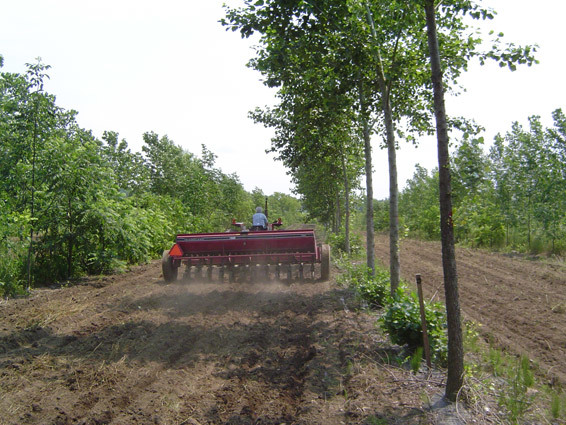Projets

- Période: 2006-01-01 2009-12-31
Aperçu
The overall objective of this work is to evaluate the environmental and economic thresholds and tradeoffs in tree-based intercropping systems that would be needed to develop a commercial enterprise in Canada.
Présentation du projet
This project is based on the need to model ecosystem-level processes and inter-relationships to develop better policies for sustainable resource use, especially where there are many stakeholders and competing interests. The overall objective of this work is to evaluate the environmental and economic thresholds and tradeoffs in tree-based intercropping systems that would be needed to develop a commercial enterprise in Canada.
Our group is studying tree and crop growth, soil quality and greenhouse gas emissions in agroforestry research sites in Quebec at St. Paulin (4 years old), St. Edouard (4 years old) and St-Rémi (8 years old) and Guelph, Ontario (21 years old). Biophysical data has been incorporated into the Ecosys model to evaluate the carbon budget of tree-based intercropping systems compared to conventional agriculture. The FARM-SAFE model is being used to determine the economic feasibility of temperate tree-based intercropping systems. This work contributes to a deeper understanding of the environmental and economic benefits that can accrue from the adoption of tree-based intercropping systems in Canada.
Partenaires: McGill University ; Université de Sherbrooke ; University of Guelph ; University of Alberta ; Université Laval ; Jardin botanique de Montréal ; Agriculture et agro-alimentaire Canada.
Collaboration: Ontario Ministry of Agriculture and Food ; Ministère de l’agriculture, des pêcheries et de l’alimentation du Québec (MAPAQ) ; Ferme les Arpents Verts ; Centre SÈVE ; Agence de mise en valeur de la forêt privée de l’Estrie ; Réseau Ligniculture Québec ; Agence regionale de mise en valeur des forêts privées mauriciennes ; Féderation des producteurs de bois du Québec ; Union des producteurs agricoles (UPA); Agence forestière de la Montérégie ; Institut de recherche et de développement en agroenvironnement ; Domtar Inc. ; Concept Éco Plein-Air Le Baluchon ; Association des fabricants de meubles du Québec ; Observatoire de l’environnement et du développement durable.
Financement: Conseil de la recherche en sciences naturelles et génie du Canada (CRSNG), 2006-2009.
Contacts: joann.whalen@mcgill.ca / robert.bradley@usherbrooke.ca